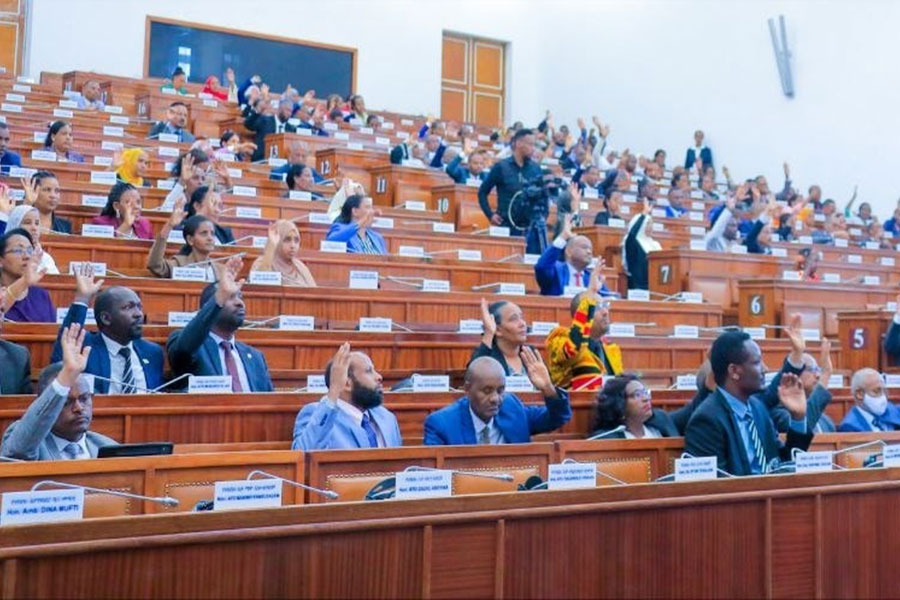
Radar | Nov 27,2023
In the small village nestled among the foothills of Adwa town in Tigray Regional State, TewoldeBerhan GebreEgziabher (PhD) was born to a farmer’s family, destined to follow in the footsteps of his forefathers. However, the winds of modern education swept him away from the fields, turning him into a tireless advocate for farmers’ rights and environmental protection laws on the international stage.
His love and connection to nature remained strong throughout his life. He firmly argued against the contamination of organic crops and animals when cultivating genetically modified organisms (GMOs). He fought for the right to choose what to grow and what to eat. His advocacy for appropriate labelling before modified genes enter the environment made him a force to be reckoned with during negotiations.
Tewolde gained international recognition as a leading environmental negotiator, playing a pivotal role in developing the Cartagena Protocol on Biosafety, a key international agreement for regulating the movement of genetically modified organisms across national borders. He has also been instrumental in negotiations under the United Nations Framework Convention on Climate Change (UNFCCC) and the Convention on Biological Diversity (CBD).
Throughout his career, Tewolde has championed the cause of environmental justice, emphasizing the importance of the equitable distribution of resources and benefits arising from utilising biological resources. He has consistently highlighted the need to address the concerns of developing countries in global environmental discussions. He has strongly advocated for the fair sharing of benefits derived from using traditional knowledge and genetic resources.
Tewolde led the Ethiopian delegation and was chosen as the chief negotiator representing the African Group, the developing countries Group, and all negotiators except the Miami Group, which consisted of five countries. These intense debates saw him pitted against powerful multinational corporations advocating for GMOs, so much so that his late wife, Susan Edwards, would worry for his life.
He was a father to his three daughters and nearly 60 children fostered in his home. Many achieved academic success and followed in his footsteps, earning doctorate titles. His dedication to education was evident when he walked to high school at General Wingate in Addis Abeba barefoot.
Tewolde’s academic journey took him from Haile Selassie I University, where he graduated with honours, to Bangor University in the United Kingdom, where he pursued a doctorate in plant ecology. He travelled to the remote mountainous town by land and sea, preferring to marvel at nature’s wonders.
Upon his return to Ethiopia, he rejoined Addis Ababa University with funding secured to run the Ethiopia and Eritrea flora project, cataloguing the region’s plants for over three decades. He was known for imparting wisdom with wit and humour, making his teachings engaging and enjoyable. Teaching was a calling for Tewolde, who started as a lecturer and worked to become dean of the Faculty of Science.
His colleagues remembered him for his easygoing personality and humble approach to farmers and rural life.
Zenebe Wola, a close friend and biographer, described Tewolde as someone who protected his rights without infringing on those of others.
During the war that led to Eritrea’s breakaway from Ethiopia, Tewolde was the president of Asmara University. He faced the immense challenge of sustaining the livelihood of his students when communication lines were severed. He mobilized available resources to cover the meal expenses of nearly 2,000 students for about a year. When the war peaked, Tewolde made the difficult decision to evacuate his students from the war zone to Agarfa town in the Oromia Regional State, where they could finish their studies.
Returning to Addis Ababa, Tewolde began working on his lifelong passion for environmental protection.
In 1995, he was appointed the Environmental Protection Authority (EPA) founding director, responsible for developing and implementing national environmental policies and regulations. Under his leadership, the EPA facilitated the integration of environmental protection and sustainable development. A decade later, the United Nations Environmental Programme recognized his outstanding contributions, naming him Champion of the Earth. It was a deserving recognition preceded by an honour bestowed on him in 2000, the Right Livelihood Award, also known as the “Alternative Nobel Prize”.
Tewolde was an avid reader and enjoyed keeping up with current affairs on the news. His love for reading was a quality he shared with his brother, the renowned author Sebhat GebreEgziabher. His well-rounded knowledge and excellent command of the English language enabled him to articulate his views and advocate for what he cherished most—nature.
Roman TewoldeBerhan, his firstborn, recalled her father living his life with passion and caution. She remembered his regular check-ins with a worried tone whenever she was out late. Long walks in the woods where Tewolde passionately talked about plants were memories Roman would treasure forever.
The years that followed his wife’s passing, combined with the outbreak of the COVID-19 pandemic, took a toll on Tewolde’s health. The disruption of his usual walking routines and confinement at home contributed to the gradual decline of his overall well-being.
Yet, adversity did not deter him from raising his voice when he learned that the Ethiopian government was permitting the cultivation of genetically modified crops three years ago, something he had fought against all his life. He penned an open letter, published in the “Ethiopia Observer”, urging the government to uphold international law.
Tewolde’s efforts to safeguard Africa’s biodiversity and promote environmental justice have earned him a reputation as an influential environmental leader on the continent. His work has not only inspired a new generation of African environmentalists but has also significantly shaped international environmental policies and agreements, ensuring that the concerns of Africa are heard and addressed in global forums.
Despite the challenges he faced, his unwavering commitment to his cause serves as a testament to the power of conviction and dedication in pursuing a better world.
Tewolde’s life was a journey guided by a deep love and respect for the natural world and the people who depend on it. From the foothills of Adwa town to the halls of international negotiations, he fought for a world where nature and humanity could coexist harmoniously.
He believed that humans are bound to pay their debt for consuming all the grains, sugar cubes, and extracted butter in life upon their death. TewoldeBerhan was laid to rest at Holy Trinity Cathedral.
PUBLISHED ON
Apr 03,2023 [ VOL
24 , NO
1196]

Radar | Aug 26,2023

Commentaries | Jul 17,2022

Sunday with Eden | Apr 28,2024

Commentaries | Jul 12,2025

Radar | May 24,2025

Dec 22 , 2024 . By TIZITA SHEWAFERAW
Charged with transforming colossal state-owned enterprises into modern and competitiv...

Aug 18 , 2024 . By AKSAH ITALO
Although predictable Yonas Zerihun's job in the ride-hailing service is not immune to...

Jul 28 , 2024 . By TIZITA SHEWAFERAW
Unhabitual, perhaps too many, Samuel Gebreyohannes, 38, used to occasionally enjoy a couple of beers at breakfast. However, he recently swit...

Jul 13 , 2024 . By AKSAH ITALO
Investors who rely on tractors, trucks, and field vehicles for commuting, transporting commodities, and f...

Oct 18 , 2025
The political establishment, notably the ruling party and its top brass, has become p...

Oct 11 , 2025
Ladislas Farago, a roving Associated Press (AP) correspondent, arrived in Ethiopia in...

Oct 4 , 2025
Eyob Tekalegn (PhD) had been in the Governor's chair for only weeks when, on Septembe...

Sep 27 , 2025
Four years into an experiment with “shock therapy” in education, the national moo...